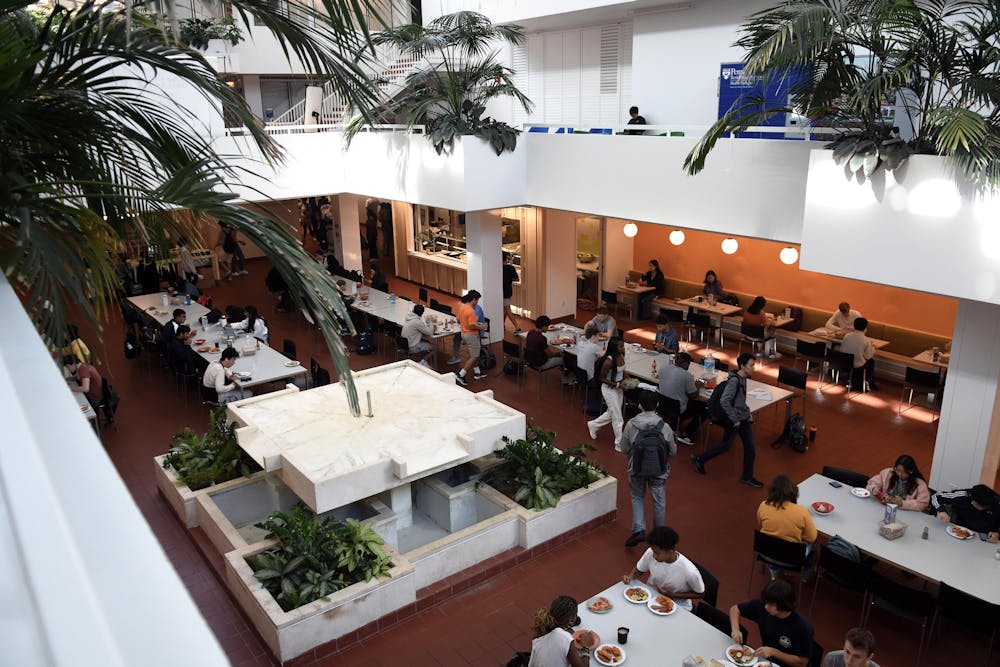
Columnist Mariana Martinez describes her personal experiences with Penn's dining services.
Credit: Anna VazhaeparambilA text from my friend lit up my phone.
“Dude, you’re literally getting the reverse Freshman 15!”
“The what?” I replied.
As an international student, I had no idea that Freshman 15 was a thing. But by the time I found out what it was, it was already too late. My eating schedule became very irregular: I skipped meals thinking it was more practical for me. Because of Penn’s poor dining services and few inclusive food options, my physical and mental health were severely affected by the end of my first semester.
Before coming to Penn, when people asked me what I would miss most from Colombia, I usually answered by saying I'd miss the food. But as my first semester flew by, I realized it went beyond missing my country’s food and more into an overwhelming transition and violent adjustment to the American diet, characterized by fast-food consumption, takeout over-reliance, and a lack of fresh food. It made my transition to college even more overwhelming than it already was.
I never expected diet to pose the challenge it did during my first semester. I didn’t expect my food options to narrow so suddenly. The differences between the American and other countries’ diets cause international students to mess up their meal structure. In the midst of the American diet, breakfast becomes the least important meal, meal times become arbitrary, and late dinners are frequent.
I found myself skipping breakfast because I couldn’t tolerate American breakfast foods: bacon, potatoes, sausage, casseroles. I stopped eating fruit, and I started eating only one large meal a day. At the same time, I was pushing myself to be my best in my classes, clubs, and job while running on very little fuel. By winter break, my body was pretty much destroyed.
As I asked other international students about their dining habits, I found that my experience was not an isolated one. Some of them told me that they “just don’t know what to eat anymore.” Others said that because of their international status, they had a limited budget to eat off-campus and that relying on Penn’s terrible food was torturous.
Surveys have shown that as international students transition into their lives at American universities, many face dietary challenges and health consequences. For instance, many international students report a halt in their fruit and vegetable consumption because they believe the United States’ options are not as fresh. Others report severe weight loss/gain and stomach issues from struggling to adapt to an American diet that consists mainly of meals large in sugars and fat.
Back in Colombia, I was used to having almost five meals a day. My diet included cereals and a variety of meats, vegetables, and fruits. Other international students also report being accustomed to multi-course meals, often characterized by a careful, homemade preparation. On the other hand, the American diet narrows down choices abruptly. International students describe their choices as pizza, salad, pasta, French fries, sandwiches, and chicken — which holds true to the quintessential Penn dining experience.
Being thrown into a poor dietary environment has a significant impact on students’ mental health. Many studies show that students with poor dietary conditions are more likely to suffer from depression and anxiety. The dietary conditions at Penn have impacted my emotional well-being: It is very frustrating to feel like I have no high-quality dining options. The strain on my wallet as I buy groceries and off-campus food is also stressful, considering around a third of Penn’s international students are on financial aid.
The international student experience with the food at Penn can only be described as aggravating. Not only is the American diet more unhealthy than food in international students’ countries, but it also causes disruptions in meal structure and health. As a school that prides itself on being diverse, Penn should really focus on making the dining experience more accessible for its international students. Not to mention an improvement in the food would benefit the whole student body, given recent events. It is clear that this becomes a matter beyond just food: it’s also about inclusivity, general well-being, and enjoying the college experience.
MARIANA MARTINEZ is a College first year studying English and classics from Bogotá, Colombia. Her email is marmari@sas.upenn.edu.
The Daily Pennsylvanian is an independent, student-run newspaper. Please consider making a donation to support the coverage that shapes the University. Your generosity ensures a future of strong journalism at Penn.
Donate






